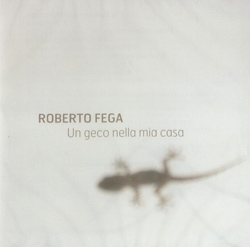
Un Geco Nella Mia Casa augurs some of the social and philosophical implications of the aestheticizing of viral breakdown and digital distress. Any sort of magnetic distance between elements is depolarized and a grand liquidity, strangeness, and unreality abounds, sparkling in its venality.
There is a frisson of excitement evident in the playing with of all these hieroglyphs of digital dysfunction. This is reflected sonically, in the scrapes, pointillist percussion, disjointed metal, dulled, toxic drones, metamorphoses, and small moments of prolapse. At first blush, the music seems shaggy and boneless, as randomly distributed as bits of rubbish thrown together, only accidentally cohering here and there. Indeed, a certain pleasure is taken in the accidental, in a cruel, arbitrary order, but further investigation affords an appreciation for the sheer audacity of this seeming indifference and self-denial, which better enables things to hang together so loosely, and thus making these recordings feel foreign, as though constructed in accordance to some other, less discernible order.
The aestheticizing in question also turns these sparsely rhythmic and textural palette's toward ends of a more traditional sort. During tracks such as "La storia rubata" and "Quando la cadillac si fermera" Fega and the other players tend toward a dense and cerebral complexity, with electronic patina's wrinkled with squiggles of lightning finger dexterity and string curlicues, painted with a subtle control of volume, timbre, and delay. This approach enables Fega to map correlations and significant divergences between these two realms, the end result being a supreme equilibrium fraught with spasms and convulsions.
It's broken only by the odd piece, specifically "Insurgente", which includes a spoken word gambit, rubbing desperately up alongside sustained grainy multiphonics and some pensive grinding on cello. Here the album betrays its own principles, allowing them to be buried beneath a veneer of idiomatic pastiche. Other pieces exceed their own basic forms, generally by scraping and
ebbing sparely, rising periodically to high tides of irate (musical)
disagreement, then waning into near silent probing, and they are all a
good deal more successful for it. Such pieces generally being the rule, Un Geco Nella Mia Casa shows that sound, virtuosity, and concept are now in the ascendant.
Max Schefer
Comments and Feedback:
|



